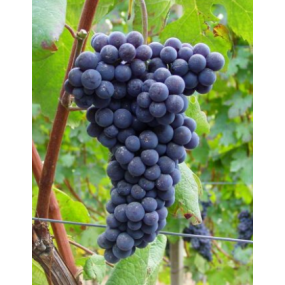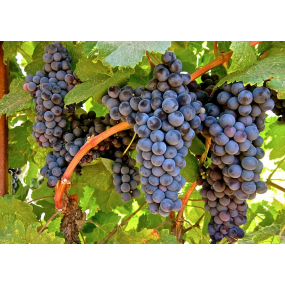Plants
Default Category, Plants, Grapevines, Resources, Vine Finder, Grapevines by Use, Wine, Grapevines by Zone, Hardiness Zone 4, Hardiness Zone 5, Hardiness Zone 6, Hardiness Zone 7, Hardiness Zone 8, Hybrid Varieties
Landot Noir (Landot 4511)
Landot Noir has both late bud break and early maturity, making it suitable for short-season climates. Makes a mild, fruity red wine used as a varietal or for blending.
Default Category, Plants, Grapevines, Resources, Vine Finder, Grapevines by Use, Wine, Grapevines by Zone, Hardiness Zone 4, Hardiness Zone 5, Hardiness Zone 6, Hardiness Zone 7, Hardiness Zone 8, Hybrid Varieties
Léon Millot
Léon Millot is a sister of Marechal Foch, earlier-ripening and typically more productive. Wines are similar to those made from Foch with distinct berry aromas and are often blended with Foch.
Default Category, Plants, Grapevines, Resources, Vine Finder, Grapevines by Use, Wine, Grapevines by Zone, Hardiness Zone 3, Hardiness Zone 4, Hardiness Zone 5, Hardiness Zone 6, Hardiness Zone 7, Hardiness Zone 8, Hybrid Varieties
Louise Swenson
Louise Swenson produces small to medium-sized clusters of round, medium-sized berries that turn yellow-gold when ripe. It has naturally low sugar with moderate acidity, wines are light-bodied with a delicate aroma of hon...
Default Category, Plants, Grapevines, Resources, Vine Finder, Grapevines by Use, Wine, Grapevines by Zone, Hardiness Zone 7, Hardiness Zone 8, Grafted Vinifera, Grafted Hybrids, Certified Availability 2020, Grapevines by Rootstock, 101-14 Rootstock, 1103P Rootstock
Malbec - Grafted
Malbec was once popular in Bordeaux, but plantings have declined as it is susceptible to various viticultural hazards such as frost, coulure, and bunch rot. Known to require a milder climate than varieties such as Merlot...
Default Category, Plants, Grapevines, Resources, Vine Finder, Grapevines by Use, Wine, Grapevines by Zone, Hardiness Zone 4, Hardiness Zone 5, Hardiness Zone 6, Hardiness Zone 7, Hardiness Zone 8, Hybrid Varieties
Maréchal Foch
Maréchal Foch is an early ripening black grape with small berries and clusters, often susceptible to bird predation. It can be made into a variety of wines ranging from light and fruity to full-bodied.
Default Category, Plants, Grapevines, Resources, Vine Finder, Grapevines by Use, Wine, Grapevines by Zone, Hardiness Zone 3, Hardiness Zone 4, Hardiness Zone 5, Hardiness Zone 6, Hardiness Zone 7, Hardiness Zone 8, Hybrid Varieties
Marquette
Marquette is rapidly becoming the most popular northern red grape variety. Typically maturing with high sugar content and moderate acidity, Marquette can produce complex wines with attractive ruby color and pronounced t...
Default Category, Plants, Grapevines, Resources, Vine Finder, Grapevines by Use, Wine, Table, Grapevines by Zone, Hardiness Zone 5, Hardiness Zone 6, Hardiness Zone 7, Hardiness Zone 8, Seedless Grapes
Marquis
Marquis is a productive vine with large clusters of large spherical berries with melting texture and excellent flavor. Fruit holds well on the vine and after harvest. Marquis has been used to make a fruity table wine wi...
Default Category, Plants, Grapevines, Resources, Vine Finder, Grapevines by Use, Wine, Grapevines by Zone, Hardiness Zone 7, Hardiness Zone 8, Grafted Vinifera, Grafted Hybrids, Certified Availability 2020, Grapevines by Rootstock, 101-14 Rootstock, 3309 Rootstock, Riparia Rootstock
Merlot - Grafted
Merlot is Bourdeaux's most planted grape variety, known for its smooth texture and outstanding varietal wines, but often blended with Cabernet Sauvignon. Earlier ripening than Cabernet Sauvignon, but not as winter hardy.
Default Category, Plants, Grapevines, Resources, Vine Finder, Grapevines by Use, Wine, Grapevines by Zone, Hardiness Zone 7, Hardiness Zone 8, Grafted Vinifera, Grafted Hybrids, Certified Availability 2020, Grapevines by Rootstock
Mourvédre - Grafted
Mourvédre is Spain's second-leading red variety (after Grenache) and is also a popular variety in southern France, and has been grown in California since the 1870s. Mourvédre needs a very warm climate with long summers...
Default Category, Plants, Grapevines, Resources, Vine Finder, Grapevines by Use, Wine, Grapevines by Zone, Hardiness Zone 7, Hardiness Zone 8, Grafted Vinifera, Grafted Hybrids, Certified Availability 2020, Grapevines by Rootstock, 3309 Rootstock, 1103P Rootstock
Nebbiolo - Grafted
Nebbiolo is native to the Piedmont region in northern Italy where it produces the region's most distinguished wines, and some of Italy's best, long-lived wines.
Default Category, Plants, Grapevines, Resources, Vine Finder, Grapevines by Use, Table, Grapevines by Zone, Hardiness Zone 5, Hardiness Zone 6, Hardiness Zone 7, Hardiness Zone 8, Seedless Grapes
Neptune
Neptune - [Pat. PP12,302] produces large, attractive, conical clusters with yellow-green, non-slipskin berries. Any seed traces are soft and unnoticeable when eating. Moderately thick skin resists cracking, flavor is ...
Default Category, Plants, Grapevines, Resources, Vine Finder, Grapevines by Use, Wine, Table, Grapevines by Zone, Hardiness Zone 6, Hardiness Zone 7, Hardiness Zone 8, American Varieties
New York Muscat
New York Muscat produces reddish-black fruit with fine muscat flavor. Used for sweet muscat wines and as a dosage in champagne, its largest drawback is lack of winter hardiness.
Default Category, Plants, Grapevines, Resources, Vine Finder, Grapevines by Use, Wine, Juice, Jelly, Grapevines by Zone, Hardiness Zone 5, Hardiness Zone 6, Hardiness Zone 7, Hardiness Zone 8, American Varieties
Niagara
Niagara is an attractive, productive and vigorous variety with large, slipskin berries, juicy with a strong foxy flavor. Niagara is the leading green grape grown in the United States, used as a table grape and for juices...
Default Category, Plants, Grapevines, Resources, Vine Finder, Grapevines by Use, Wine, Grapevines by Zone, Hardiness Zone 5, Hardiness Zone 6, Hardiness Zone 7, Hardiness Zone 8, Hybrid Varieties
Noiret
Noiret produces an excellent full-bodied, richly colored wine. The wines can resemble Shiraz (Syrah) with a distinct black pepper character, moderate tannins, and notes of raspberry, blackberry and mint. Vines are vigoro...
Default Category, Plants, Grapevines, Resources, Vine Finder, Grapevines by Use, Wine, Grapevines by Zone, Hardiness Zone 5, Hardiness Zone 6, Hardiness Zone 7, Hardiness Zone 8, Grafted Vinifera, Grafted Hybrids, Hybrid Varieties, Grapevines by Rootstock, 101-14 Rootstock, Riparia Rootstock
Noiret – Grafted
Noiret produces an excellent full-bodied, richly colored wine. The wines can resemble Shiraz (Syrah) with a distinct black pepper character, moderate tannins, and notes of raspberry, blackberry and mint. Vines are vigoro...
Out of Stock
Default Category, Plants, Grapevines, Resources, Vine Finder, Grapevines by Use, Wine, Grapevines by Zone, Hardiness Zone 4, Hardiness Zone 5, Hardiness Zone 6, Hardiness Zone 7, Hardiness Zone 8, American Varieties
Norton (Cynthiana)
Norton (also known as Cynthiana) is a V. labruscana x V. aestivalis hybrid with a long history in eastern US wine production, particularly in Missouri and Virginia. Norton produces small to medium clusters of firm, round...
$13.75
As low as
$5.25
Out of stock
View Details
Default Category, Plants, Grapevines, Resources, Vine Finder, Grapevines by Use, Wine, Grapevines by Zone, Hardiness Zone 4, Hardiness Zone 5, Hardiness Zone 6, Hardiness Zone 7, Hardiness Zone 8, Grafted Vinifera, Grafted Hybrids, Certified Availability 2020, Grapevines by Rootstock, 101-14 Rootstock, 1103P Rootstock
Norton (Cynthiana) - Grafted
Norton (also known as Cynthiana) is a V. labruscana x V. aestivalis hybrid with a long history in eastern US wine production, particularly in Missouri and Virginia. Norton produces small to medium clusters of firm, round...
Default Category, Plants, Grapevines, Resources, Vine Finder, Grapevines by Use, Wine, Grapevines by Zone, Hardiness Zone 5, Hardiness Zone 6, Hardiness Zone 7, Hardiness Zone 8, Grafted Vinifera, Grafted Hybrids, Hybrid Varieties
Aravelle (NY810315.17)
Formally NY 81.0315.17, Aravelle is sold only as grafted vines as own-rooted vines are not sufficiently vigorous in most locations. Excellent wine quality potential with much less susceptibility to botrytis bunch rot tha...
Default Category, Plants, Grapevines, Resources, Vine Finder, Grapevines by Use, Wine, Grapevines by Zone, Hardiness Zone 4, Hardiness Zone 5, Hardiness Zone 6, Hardiness Zone 7, Hardiness Zone 8, Hybrid Varieties
Osceola Muscat
Osceola Muscat is a relatively new variety, one of the most hardy varieties with muscat character, but with very early bud break.
Default Category, Plants, Grapevines, Resources, Vine Finder, Grapevines by Use, Wine, Grapevines by Zone, Hardiness Zone 7, Hardiness Zone 8, Grafted Vinifera, Grafted Hybrids, Certified Availability 2020, Grapevines by Rootstock, 101-14 Rootstock, 3309 Rootstock, Riparia Rootstock
Petit Manseng - Grafted
Petit Manseng is a high quality wine grape with small, thick-skinned berries that yield little juice but can hang well.
Default Category, Plants, Grapevines, Resources, Vine Finder, Grapevines by Use, Wine, Grapevines by Zone, Hardiness Zone 7, Hardiness Zone 8, Grafted Vinifera, Grafted Hybrids, Certified Availability 2020, Grapevines by Rootstock, 101-14 Rootstock, 3309 Rootstock, Riparia Rootstock, 420A Rootstock
Petit Verdot - Grafted
Petit Verdot is one of the classic black Bordeaux varieties. It is known for high quality where it can fully ripen, which is later than that of Cabernet Sauvignon.
Default Category, Plants, Grapevines, Resources, Vine Finder, Grapevines by Use, Wine, Grapevines by Zone, Hardiness Zone 7, Hardiness Zone 8, Grafted Vinifera, Grafted Hybrids, Certified Availability 2020
Petite Sirah - Grafted
Petite Sirah became popular in France for its resistance to downy mildew but has since fallen from favor there, it is currently being planted on an experimental basis in many locations in the US.
Default Category, Plants, Grapevines, Resources, Vine Finder, Grapevines by Use, Wine, Grapevines by Zone, Hardiness Zone 7, Hardiness Zone 8, Grafted Vinifera, Certified Availability 2020, Grapevines by Rootstock, 101-14 Rootstock
Pinot Blanc - Grafted
Likely discovered in Burgundy in the late 19th century as a sport of Pinot Gris (itself a sport of Pinot Noir), Pinot Blanc is widely planted in central Europe. Sometimes confused with Chardonnay but often known for its ...
Default Category, Plants, Grapevines, Resources, Vine Finder, Grapevines by Use, Wine, Grapevines by Zone, Hardiness Zone 7, Hardiness Zone 8, Grafted Vinifera, Grafted Hybrids, Certified Availability 2020, Grapevines by Rootstock, 101-14 Rootstock, 3309 Rootstock
Pinot Gris - Grafted
Pinot Gris is a lighter-skinned mutation of Pinot Noir that produces small, compact clusters of berries ranging in color from pink, to coppery-gray, to brownish-pink, even within the same cluster. Its low acidity makes t...
Default Category, Plants, Grapevines, Resources, Vine Finder, Grapevines by Use, Wine, Grapevines by Zone, Hardiness Zone 7, Hardiness Zone 8, Grafted Vinifera, Grafted Hybrids, Certified Availability 2020, Grapevines by Rootstock, 101-14 Rootstock, 3309 Rootstock
Pinot Noir - Grafted
Pinot Noir is the classic red Burgundy cultivar, it ripens best under cool, dry conditions and is best suited for cool but moderate climates. Wines are lower in tannins and pigments than the other great French wine varie...

























